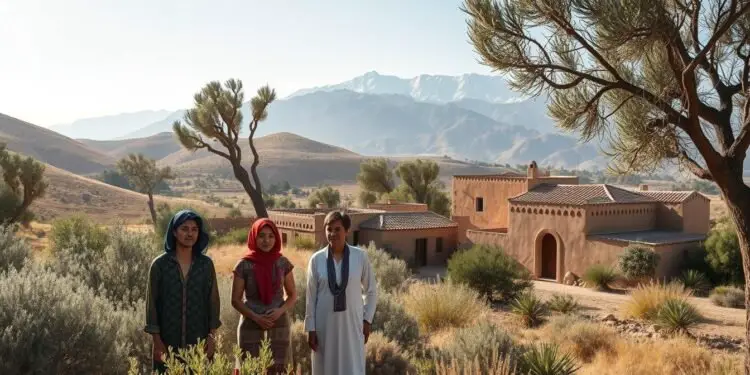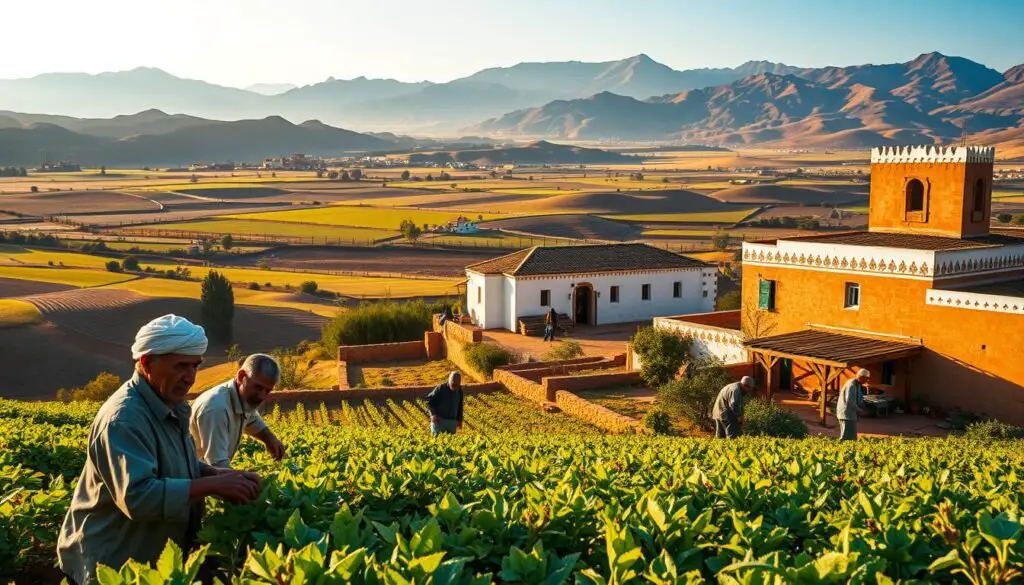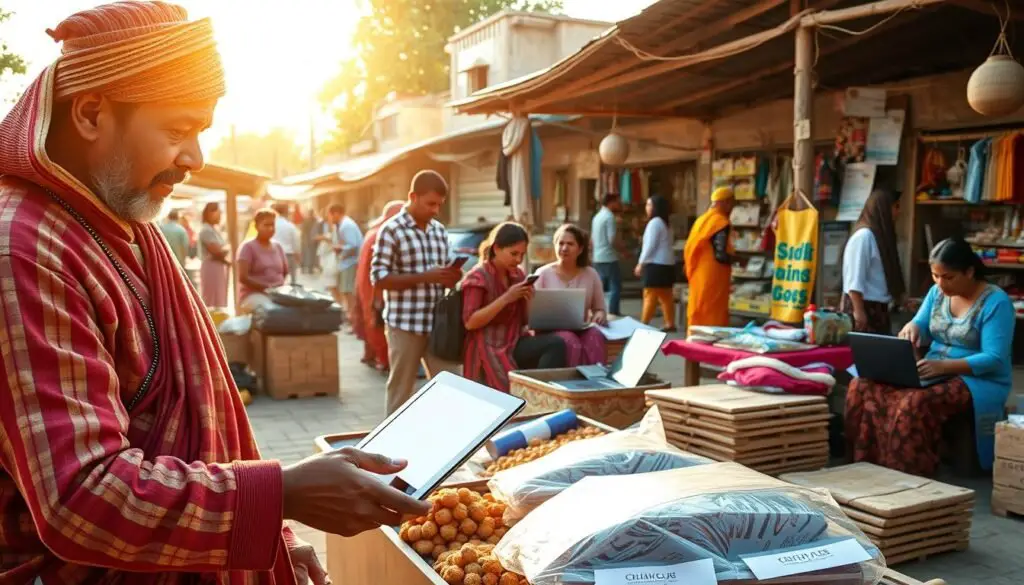What if the key to economic transformation lies not in bustling cities, but in the untapped potential of the countryside? Across Morocco, small communities are proving that innovation thrives beyond urban centers. From agribusiness to eco-tourism, local ventures are reshaping livelihoods and fueling progress.
Agricultural sectors contribute significantly to GDP, while institutions like the Hassan II Agronomic Institute drive research for sustainable development. Youth engagement and gender parity are emerging as vital forces, ensuring inclusive growth. Women-led cooperatives, for instance, are revitalizing traditional crafts and food production.
With demographic shifts and policy support, these areas are becoming hubs for opportunity. The fusion of tradition and modern techniques creates a unique landscape for future rural entrepreneurship. Could this be a blueprint for broader economic resilience?
Key Takeaways
- Agricultural sectors are central to economic growth in smaller communities.
- Research institutions play a pivotal role in sustainable development.
- Youth and women are key drivers of innovation and equity.
- Agribusiness and eco-tourism offer promising opportunities.
- Collaboration among stakeholders ensures long-term success.
The Current Landscape of Rural Morocco
Beyond the vibrant cities, Morocco’s countryside holds untapped economic promise. Nearly 40% of the population—15 million people—call these areas home. Agriculture drives 13% of the national GDP, proving its vital role.
Demographic and Economic Profile
Rural communities face a stark contrast to urban centers. The poverty rate here is 32%, triple that of cities. Yet, rural youth are increasingly leveraging local resources to bridge this gap.
Regions like Fes-Meknes showcase potential. Olive oil from this area makes up 5% of global exports. Meanwhile, argan oil cooperatives generate over $100 million annually.
Key Agricultural Sectors
Collaborative models are transforming livelihoods. Take Cooperative Marjana: EU partnerships boosted its revenue by 200%. Such agricultural cooperatives blend tradition with modern markets.
Challenges persist, but innovation thrives. With strategic support, these communities could redefine entrepreneurship across the nation.
Understanding Rural Entrepreneurship in Morocco
Small-town ventures are rewriting Morocco’s economic playbook with grassroots ingenuity. Unlike urban startups, these businesses thrive on local traditions and community ties. Nearly 68% operate informally, relying on trust networks rather than formal systems.
Defining Grassroots Business Models
Entrepreneurial intention here often stems from necessity. Agriculture drives 73% of ventures, like date farms passed through generations. Family-run operations control 89% of this sector, blending old methods with new markets.
Informal financing fuels 61% of projects. Community savings groups fill gaps where banks won’t lend. The Tafraout women’s saffron collective exemplifies this—turning a spice into global exports.
Urban vs. Rural: Key Differences
City startups focus on tech (22%), while rural ones leverage land and heritage. Access to digital tools lags—only 18% adoption versus 54% in cities. Yet, creative workarounds exist, like using mobile phones for crop pricing.
This contrast highlights untapped potential. With targeted research and support, these ventures could scale sustainably. The future lies in empowering local visionaries.
Agricultural Cooperatives as Entrepreneurial Engines
From honey to olives, cooperatives are scaling small farms into global brands. Over 15,000 moroccan agricultural cooperatives have launched since 2008 under the Green Morocco Plan. These groups blend tradition with modern markets, turning local harvests into sustainable livelihoods.
Structure and Governance of Moroccan Cooperatives
The 2014 Cooperative Law sets clear rules. Each group averages 47 members and €25k startup capital. Transparency and member voting are mandatory, though 38% face yearly governance conflicts.
Training programs help. The ODCO agency teaches financial management to youth moroccan agricultural leaders. Al Amal Cooperative used these skills to export €1.2M in honey to the EU.
Success Stories from the Fes-Meknes Region
This area leads with a 32% rise in women-led cooperatives since 2021. Olive oil ventures here supply 5% of global demand. One group, Cooperative Marjana, tripled revenue through EU partnerships.
Challenges remain, like illiteracy among leaders. Yet, the model works—proof that shared effort can uplift entire communities.
Gender Dynamics in Moroccan Rural Entrepreneurship
Women are reshaping economic narratives in areas often overlooked by traditional markets. Despite systemic barriers, female-led ventures demonstrate remarkable resilience. Recent analysis reveals these businesses often outperform male counterparts in key metrics.
Educational Disparities Between Founders
Access to schooling remains unequal. Only 23% of female founders complete secondary education, compared to 41% of men. This gap impacts business scalability and innovation capacity.
Cultural variables play a significant role. Many families prioritize sons’ education, leaving daughters with limited training opportunities. Yet successful cases like Zineb El Rhazoui prove knowledge gaps can be overcome.
Financial Resource Accessibility
Microfinance approval rates show stark differences. Men secure loans 62% of the time, while women face 34% approval rates. Traditional collateral requirements often disadvantage female applicants.
Creative solutions are emerging. Group lending models help 68% of women bypass individual credit checks. These networks build trust while providing capital.
Measuring Business Performance
Data contradicts stereotypes about risk. Women-led ventures show 27% lower failure rates than male-owned businesses. In agribusiness, they achieve 18% higher ROI according to Bouichou’s 2024 study.
The organic couscous export business founded by Zineb El Rhazoui exemplifies this success. Starting with traditional recipes, she now supplies European markets—proof that cultural heritage can become competitive advantage.
Youth Engagement in Agricultural Startups
Young innovators are turning age-old farming practices into thriving modern businesses. With 41% participation in vocational programs like IHYAE, entrepreneurial intentions are surging among the next generation. Universities like UM6P fuel this shift through initiatives such as AgriENGAGE, blending mentorship with hands-on tech training.
Educational Programs Firing Ambition
AgriTech Youth Bootcamps have trained 850 graduates since 2020, equipping them with drone operation and precision farming skills. These programs bridge gaps in formal education, fostering intention among rural youth to launch ventures. The AgriFood Tech Incubator at UM6P further supports startups with funding and market access.
Roadblocks on the Path to Success
Land ownership remains a hurdle—78% of young farmers lease rather than own plots. Digital access is another barrier; only 29% have stable internet for agri-apps. Despite this, pioneers like Youssef El Khamlichi prove progress is possible. His drone irrigation startup now serves 120 farms, cutting water use by 40%.
Policy gaps persist, such as lacking incentives for under-30 registrations. Yet, with tailored support, youth-led agribusiness could become Morocco’s economic backbone.
Digital Transformation in Rural Businesses
Digital tools are rewriting the rules for small businesses far from city centers. While urban areas dominate e-commerce, only 22% of remote ventures use online platforms compared to 61% in cities. This gap reveals untapped potential for growth and efficiency.
Adoption Rates of E-Commerce Platforms
Mobile payments surged by 43% since the pandemic, offering faster transactions for farming activities. Yet, just 1,800 villages have reliable internet access, limiting scalability. Programs like AgriChain defy these odds, linking 15,000 growers to global markets.
Mobile Technology Applications in Agribusiness
Soil sensors boost yields by 25%, proving IoT’s value. Over 12,000 entrepreneurs now train annually in digital literacy, yet 68% fear cyber threats. These hurdles highlight the balance between opportunities and risks in tech adoption.
Smartphones help bridge access gaps, with apps providing real-time crop pricing. As networks expand, these innovations could redefine traditional trade structures nationwide.
Government Initiatives Supporting Rural Ventures
Strategic investments are transforming traditional farming areas into economic powerhouses. The Moroccan government has prioritized development programs that combine infrastructure with skills training. These efforts aim to create sustainable business ecosystems beyond major cities.
IHYAE Project: Blueprint for Growth
The Integrated Horticulture and Youth Agricultural Employment (IHYAE) initiative spans 19 provinces across three key regions. With €48M allocated through 2026, it focuses on tangible outcomes. The plan includes 14 agri-processing hubs to modernize local production chains.
Training forms a core component, with certifications for 5,000 participants. A digital DSS dashboard tracks quarterly results, ensuring accountability. Early data shows 32% increased productivity in pilot zones.
Collaborative Models Driving Change
Public-private partnerships demonstrate particular success. OCP Group’s fertilizer subsidy program has benefited 8,000 cooperatives since 2021. Similar projects integrate green hydrogen technology into farming operations.
These models reduce risks while scaling impact. As investments mature, they could shape the future of community-led development nationwide. The approach balances immediate needs with long-term sustainability goals.
Access to Capital and Financial Inclusion
Financial barriers often stand between vision and reality for small-scale ventures. While 44% of Moroccans now have bank accounts, only 6% of micro-enterprises secure traditional loans. This gap fuels alternative funding models that empower grassroots growth.
Microfinancing Bridges the Gap
Al Amana Microcredit leads with €120M disbursed in 2022, serving those excluded from banks. Their group-lending model helps 68% of female applicants bypass strict collateral rules.
Islamic finance options grow rapidly, with Murabaha contracts up 22%. Crowdfunding platforms also emerge, raising €2.3M for startups last year. Yet 54% of applicants still lack proper financial records.
Grants Fuel Sustainable Ventures
The Green Fund approves 40% of applications for eco-friendly projects. Requirements include detailed sustainability plans and community impact projections.
High collateral demands block 62% of loan seekers. Other factors like limited internet access (50% coverage) complicate digital applications. Mobile payment networks now reach 31% of districts, offering hope for easier transactions.
Progress comes through hybrid solutions. Blending microfinance with training programs helps turn small business ideas into viable operations. The path forward requires both financial tools and education.
Legal Structures for Rural Enterprises
Navigating legal frameworks can make or break small ventures in emerging markets. In Morocco, choosing the right structure impacts everything from daily operations to long-term growth. The World Bank reports a 63-day average registration time, making informed decisions critical.
Comparing Registration Pathways
Cooperatives offer the most accessible entry point with €1,200 startup costs. SARL (limited liability) companies require €3,500 but provide stronger asset protection. Each model serves different business needs based on scale and member count.
The 2022 Rural Entrepreneurship Act simplified paperwork for both options. Digital submission portals now cut processing times by 40%. Still, operational efficiency lags behind regulatory improvements.
Tax Advantages for Growth
Organic producers enjoy 3-year tax holidays under new incentives. Export-focused ventures qualify for 15% VAT rebates—a game changer for international sales. These variables significantly impact profitability calculations.
Amalou Cooperative’s strategy demonstrates smart planning. By combining cooperative status with export rebates, they boosted net margins by 22%. Recent research confirms such approaches yield 30% better sustainability metrics.
Future reforms aim to further reduce compliance burdens. The focus remains on balancing oversight with support for small-scale operations.
Market Opportunities Beyond Local Borders
Global markets are opening doors for locally crafted goods in unexpected ways. European demand for organic products grew 42% last year, creating opportunities for specialty exports like argan oil, which hit €130M in 2023. Direct-to-consumer models, such as Taliouine Saffron’s EU sales strategy, prove small producers can compete internationally.
Breaking Into International Trade
The U.S.-Morocco Free Trade Agreement simplifies access to 330 million consumers. Yet 68% of producers lack export certifications, slowing market entry. E-commerce bridges this gap—online sales grew 37% annually since 2020.
Cultural Experiences as Economic Drivers
Agri-tourism merges heritage with hospitality. Over 650 guesthouses now offer immersive farm stays, engaging visitors through activities like olive harvesting. These ventures employ local people while preserving traditions.
Success stories highlight the experience economy’s potential. A family-run kasbah in the Atlas Mountains tripled revenue by adding cooking classes. Such models demonstrate how authenticity attracts premium pricing.
Barriers remain, including limited digital marketing skills. However, initiatives like Generation Green 2020-2030 provide training to scale these ventures sustainably.
Future of Rural Entrepreneurship in Morocco
The countryside’s economic landscape is evolving with tech and policy shifts. Agri-tech investments are projected to grow 9% annually, signaling a future rural boom. Climate-smart farming could cover 40% of operations by 2030, blending tradition with innovation.
Youth engagement is rising, with an expected 18% surge in startup launches by 2026. Key economic social drivers include blockchain for transparent supply chains and unified business registries. These tools will streamline growth for small ventures.
Public-private partnerships remain vital. Collaborative roadmaps can bridge gaps in infrastructure and digital access. The path forward combines local wisdom with global opportunities—transforming challenges into sustainable success.
FAQ
What are the main economic drivers in rural Moroccan communities?
Agriculture dominates, especially olive oil, argan, and citrus production. Small-scale farming and cooperatives fuel local economies, with tourism gaining traction in scenic regions.
How do agricultural cooperatives support business growth?
Cooperatives pool resources, improve market access, and provide training. Successful examples like the Fes-Meknes olive oil collectives show higher profits through shared infrastructure.
What challenges do women face in launching rural businesses?
Limited access to loans and land ownership hurdles persist. However, initiatives like Al Amana Microfinance are bridging gaps for female-led agribusinesses.
Are there tech solutions helping rural startups?
Yes. Mobile apps like DialX connect farmers to buyers, while e-commerce platforms expand market reach. Digital literacy programs boost adoption rates.
What government programs assist rural entrepreneurs?
The IHYAE project offers grants and training. Public-private partnerships, such as those with Crédit Agricole, improve funding access for small ventures.
Can young entrepreneurs access startup capital easily?
Youth face high collateral demands. Programs like Forsa and INJAZ Al-Maghrib provide microloans and mentorship to reduce barriers.
What legal structures work best for rural businesses?
Cooperatives and sole proprietorships are common. Tax breaks for agricultural startups make them attractive, but registration can be slow.
How does rural entrepreneurship differ from urban models?
Rural ventures often focus on community needs and resource-sharing. Urban businesses typically target scalable markets with faster tech integration.
What export opportunities exist for rural products?
Argan oil, dates, and handicrafts have global demand. The Morocco Green Plan aids certification for international markets.
Are tourism-based startups viable in rural areas?
Absolutely. Eco-lodges and cultural tours, like those in the Atlas Mountains, thrive. Platforms like Airbnb Experiences help locals monetize heritage.




